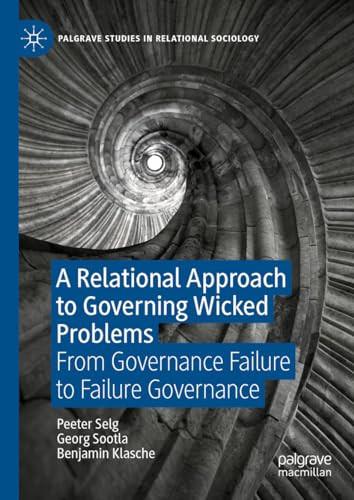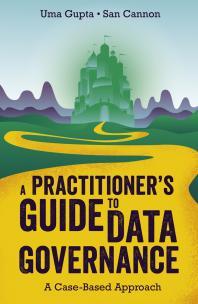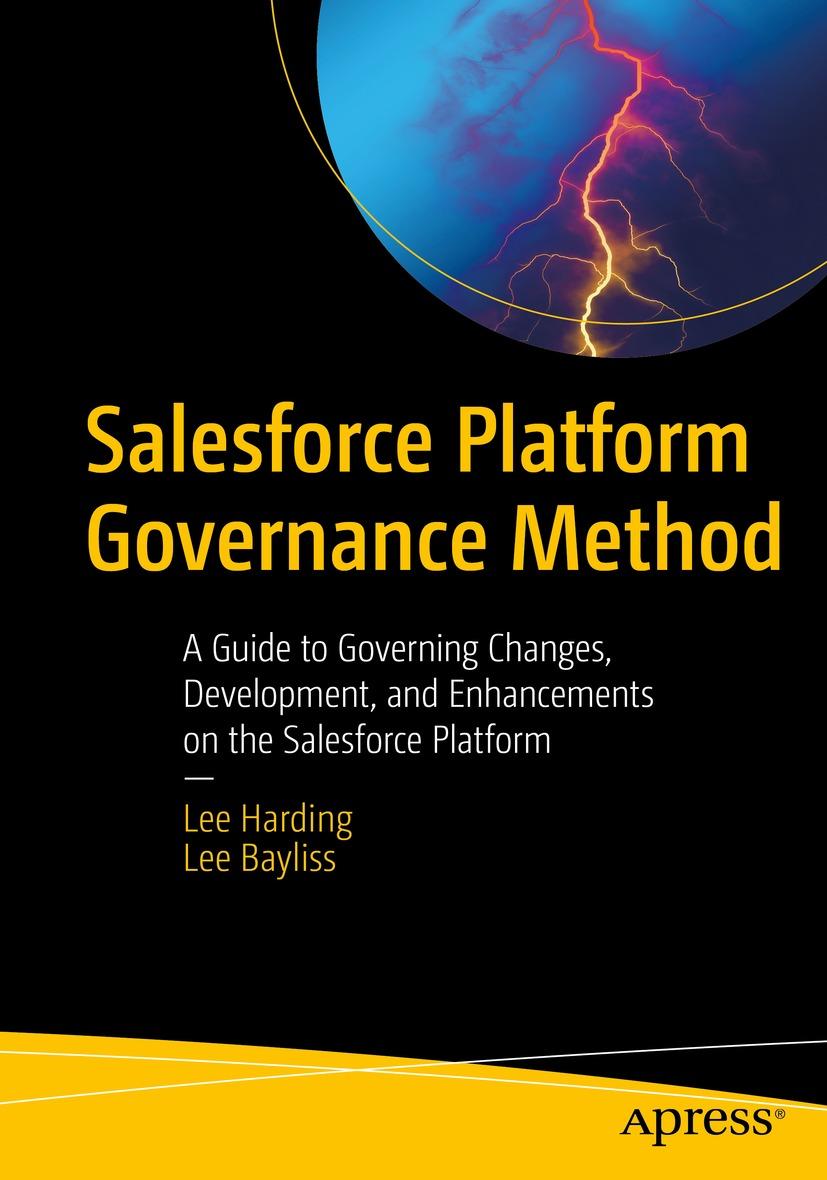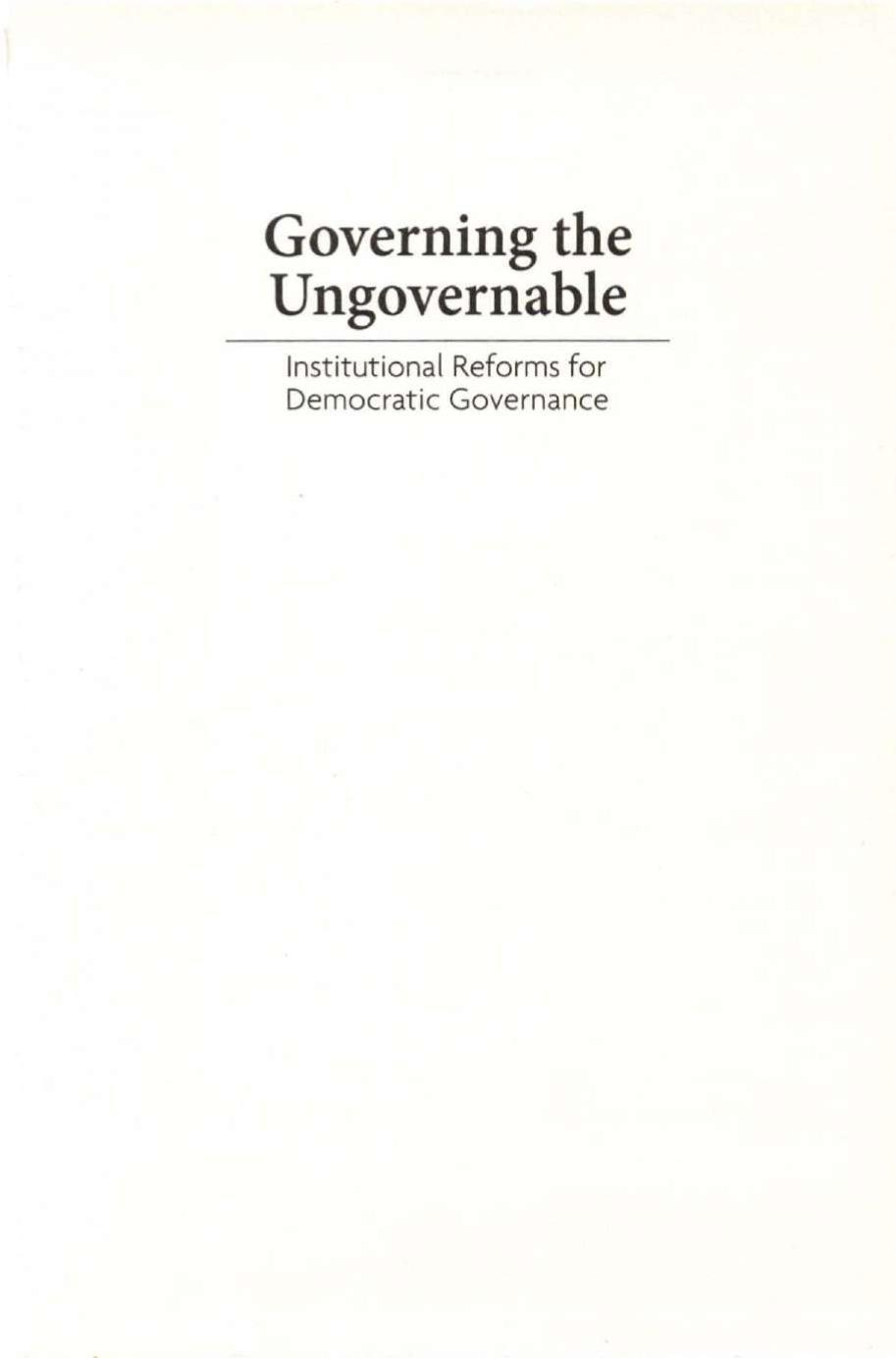A Relational Approach to Governing Wicked Problems
From Governance Failure to Failure Governance
Peeter Selg School of Governance, Law & Society
Tallinn University
Tallinn, Estonia
Benjamin Klasche
School of Governance, Law and Society
Tallinn University
Tallinn, Estonia
Georg Sootla School of Governance, Law and Society
Tallinn University
Tallinn, Estonia
ISSN 2946-4110
ISSN 2946-4129 (electronic)
Palgrave Studies in Relational Sociology
ISBN 978-3-031-24033-1 ISBN 978-3-031-24034-8 (eBook)
https://doi.org/10.1007/978-3-031-24034-8
© The Editor(s) (if applicable) and The Author(s), under exclusive licence to Springer Nature Switzerland AG 2023
This work is subject to copyright. All rights are solely and exclusively licensed by the Publisher, whether the whole or part of the material is concerned, specifcally the rights of translation, reprinting, reuse of illustrations, recitation, broadcasting, reproduction on microflms or in any other physical way, and transmission or information storage and retrieval, electronic adaptation, computer software, or by similar or dissimilar methodology now known or hereafter developed.
The use of general descriptive names, registered names, trademarks, service marks, etc. in this publication does not imply, even in the absence of a specifc statement, that such names are exempt from the relevant protective laws and regulations and therefore free for general use. The publisher, the authors, and the editors are safe to assume that the advice and information in this book are believed to be true and accurate at the date of publication. Neither the publisher nor the authors or the editors give a warranty, expressed or implied, with respect to the material contained herein or for any errors or omissions that may have been made. The publisher remains neutral with regard to jurisdictional claims in published maps and institutional affliations.
Cover credit: Philartphace/E+/Getty Images
This Palgrave Macmillan imprint is published by the registered company Springer Nature Switzerland AG.
The registered company address is: Gewerbestrasse 11, 6330 Cham, Switzerland
Paper in this product is recyclable.
Preface and acknowledgments
In this book, we argue that moving from a substantialist to a relational approach to governance entails accepting the inevitability of governance failure and orienting oneself to failure governance. Adopting failure governance is what we propose as the most reasonable strategy for governing wicked problems. In a different vocabulary: failure governance entails true acceptance of the contingency of the social and political world as we know it. Analytically it requires moving from the presumption of the “elegant” world of bounded entities, grasped by independent and dependent variables, to a world of constantly changing and constitutive relations. Accepting these features of the world, in turn, brings in the need to also move from various toolboxes to a self-refective ethos toward the world. It is similar to moving from various ethical imperatives—be they categorical or hypothetical—to the underlying ethical mechanisms themselves. To bring an even more robust parallel: it would be a movement from a list of jokes to a sense of humor. To say, “I know a lot of jokes” makes sense, but to say, “I have a sense of humor” makes way less sense since sense of humor is something that emerges out of a complex network of relations and practices (of which telling jokes could be an important part) through which one “acquires” one’s sense of humor. Also, a sense of humor is never fully given but manifests itself in practice. One cannot say that now they fnally “have” a sense of humor for good or that they soon are going to have sense of humor. Bottom line: like power and governance, sense of humor is an example of phenomena that should be approached in relational terms. But it is a huge leap—if it even is possible to take it at all—to
propose normative guidelines for how to have a great sense of humor. Similarly, in this book, we propose a relational approach to governance of wicked problems. Analytically this has been way easier a task than normatively. It is easier to imagine a world in which nothing is fxed or given than to envision some “positive program” of governance for such a world, let alone policy advice, a notion so heavily contaminated by “tools talk,” which presumes “variables talk” at the analytical level. But is there still hope for a positive program? Can we still hope to teach or give guidelines for failure governance? It is as tricky as asking how to gain a sense of humor, when all we have is a list of jokes. This is what we tackle in the current book.
Writing it has been a wicked problem for us, and in many ways, we have practiced what we preach. We want to thank Joonatan Nõgisto for carefully reading and commenting on earlier drafts of this book. Also, we thank the Estonian Research Council for the research grant PUT1485, out of which this book emerged.
Peeter would like to thank his partner Maria Koldekivi for her tremendous support and patience during the enormously diffcult times of writing this book. Georg would like to thank his wife Alija, for putting up the long hours, weeks, and months of being alone when he struggled to write his chapters. Benjamin would like to thank Peeter for inviting him to participate in the project that led to this book. He also wants to thank Peeter and Georg for thinking together, without whom this book would never have been realized. Finally, he would like to thank his wife, Airi, and his daughters, Linda and Lilian, for all their love and support.
Last but not least, we all thank the late François Dépelteau for making it all possible in this volume (and numerous others) on relational sociology. The breadth and depth of his work in setting the relational sociology movement truly afame on a global scale are still partly to be discovered, but its fruits will never be forgotten.
Tallinn, Estonia
Peeter Selg Georg Sootla Benjamin Klasche
3 From Categorical Distinctions of Policy Problems to a Relational Approach to Wicked Problems
3.1 Substantialist and Relational Understanding of Social Processes
3.1.1 Process as Instigated by “Things”: The Notion of Self-action
3.1.2 Process as “Thing”: The Notion of Inter-action
3.1.3 Process as Constitutive Relation(S): The Notion of Trans-action
3.2 From Studying to Governing Wicked Problems: From (De)Politicization to (De-)problematization
3.2.1 Colin Hay’s Model of (De)politicization
3.2.2 Toward Discursive/Semiotic Notion of (De) politicization
3.3 From Discursive Approaches to (De)politicization to the Notion of (De-)problematization of Wicked Problems
3.4 Two Ideal Types of De-problematizing Wicked Problems: Self-active and Inter-active Governance
3.4.1 Self-active Governance as Politics of De-problematization:
3.4.2 Inter-active Governance as Politics of De-problematization: Networks
4 From Governance Failure to Failure Governance: A Relational Approach to Governing Wicked Problems
4.1 Trans-Active Governance as Politics of Problematization: Governing Wicked Problems as Un-Owned Processes
4.1.1 The Contingency of the Socio-Political
4.1.2 From Contingency to Failure: Bob Jessop on Metagovernance
4.1.3 From Governance Failure to Failure Governance
4.2 Governance Failure: How and Why De-problematization
4.3 Looking Ahead: Policy Theories as Sources of Problematization and De-problematization
5
6
5.1 The Inception of “Policy Orientation”: The Context and Key Principles of
5.1.1
5.1.3
6.1
6.3.4
6.4
7 The (Re)turn to the Political: Deepening the Grasp of Contingency in the Theories of the Policy Process
7.1 On the Constitution of Policy Problems: Bringing the Political Back In
7.1.1 From Street-Level Bureaucrats to Backward Mapping: The Problem of Policy Implementation
7.2 Four Basic Patterns in Theorizing Policy as a Contingent Process
7.2.1 The Theor y of Policy Streams
7.2.2 The Theor y of
7.2.3
7.2.4
7.3 The Emergence of the Theories of Policy Networks
7.4 The Emergence of the Notion of Governance as Governing Through Networks
7.4.1
7.4.2 Mixing Theories and Practices: The Roots from New
7.4.3
7.4.4
8 Speaking Truth to Power? The (Political) Constitution of Knowledge and
8.1 Sources and Roles of Knowledge in the Policy Process: From Knowledge as Representation to Knowledge as Active Ordering
8.1.1 Herber t Simon and the Problem of (Bounded) Rationality
8.1.2 Lindblom Against Professional Social Inquir y: “Muddling Through” the Plurality of PolicyRelevant Knowledge
8.1.3
12 Making America Do Their “Own Research” Again? Trump’s Politics of De-problematization of COVID-19
12.1 C1: The US as an Epitome of Failure
12.2 Taking Stock of Alternative Explanations
12.3 The Fauci/Trump Dialectics and the Constitution “Doing Your Own Research”
12.3.1 “It’ll Go Away”
12.3.2 From “It’ll Go Away” to “New Hoax” of the Democrats to “It’s Totally Harmless”
12.3.3 “A Cheerleader for the Country” Meets Fauci
12.4 Conclusion: Making America Do Their “Own Research Again”? On the Epistemic Authority Crisis of the US
13 Germany’s Road from Failure Governance to Governance
13.3 The Beginning of the Crisis: Embracing the Ethos of Failure Governance
14 In Place of Conclusions: Failing Better or Waiting for Godot in a Clumsy World of
list of figures
Fig. 2.1 Alternative types of complex problems. (Source: Alford & Head, 2017, p. 402)
Fig. 3.1 Mapping the political realm. (Source: Hay, 2007, p. 79)
Fig. 3.2 Politicization and depoliticization. (Source: Hay, 2007, p. 79)
Fig. 3.3 Principles, tactics, and tools of depoliticization. (Source: Buller & Flinders, 2006, p. 299)
Fig. 4.1 Elegant (single-mode) solutions to global warming. (Source: Grint, 2010b, p. 24)
Fig. 4.2 Clumsy solution for the wicked problem of global warming. (Source: Grint, 2010b, p. 25)
Fig. 7.1 The pattern of the iterative policy process. (Source: Conklin, 2006, p. 10)
Fig. 10.1. Semiotic categories for constitutive explanation of the political. (Source: Selg & Ventsel, 2020, p. 242)
Fig. 10.2 Semiotic categories for explaining governance as a process of problematization and de-problematization. (Adapted from Selg & Ventsel, 2020, p. 242)
Fig. 11.1 Conditions of an effective whole-of-nation approach. (Source: Hsieh et al., 2021, p. 311)
Fig. 11.2 The drastic upsurge of COVID-19 deaths in Taiwan in spring and summer of 2021 (Source: Johns Hopkins University CSSE COVID-19 Data—retrieved October 4, 2022)
33
61
62
64
88
88
170
278
278
298
309
Introduction: A Relational Approach to Governing Wicked Problems
At the core of this book sits the endeavor to make the transition from the more common sense understanding of the world to the (processual-)relational perspective we are proposing more intuitive. To start, let us point out that our spontaneous view of the world is substantialist, the opposite of relational: in our language, we express the world as being composed of substances, rather than of emerging, unfolding processes and relations. However, as we argue, we should be relational when we think about social phenomena that we call wicked problems. Yet spontaneously, we presume a world of substances (“things,” “objects,” “subjects”) that have properties (“tall,” “heavy,” “red”) and are engaged in activities (“running,” “standing,” “walking”). Even though our everyday language is substantialist, there are some phenomena that we tend to take spontaneously as relations rather than bundles of things with properties. Take, for instance, “distance.” The distance between two trucks is defnitely a relation between them, not a thing, property, or even action of either of them. Distance has various features that make it easier to illustrate several crucial points about relational approaches. For instance, distance is always symmetric: A’s distance from B is also B’s distance from A. Thus, you cannot be simply an A that “has” a distance; A needs at least some B to “have” any distance. This means, in turn, that the distance between A and B is not reducible to either A or B. Moreover, while the distance is not reducible
© The Author(s), under exclusive license to Springer Nature Switzerland AG 2023
P. Selg et al., A Relational Approach to Governing Wicked Problems, Palgrave Studies in Relational Sociology, https://doi.org/10.1007/978-3-031-24034-8_1
1
to A or B, it is always between them and not conceivable as a separate “entity” that could be made sense of without those very As and Bs. Thus, “distance” seems to be a thoroughly relational concept in that it refers to a phenomenon that can only be understood as a relation.
However, there are still certain limitations to sticking to the fgure or metaphor of distance when rendering the relational approaches we put forth in this book. Namely, “distance” is not a concept that captures dynamic, unfolding, processual relations between As and Bs that are not only irreducible to and reciprocal between As and Bs, but are also constitutive of those As and Bs. It is precisely these kinds of relations that processual-relational scholars are talking about when they are thinking about the nature of reality in general. When it comes to social reality or to social phenomena more specifcally, they presume that not only are the relations between As and Bs incomprehensible without those As and Bs (as is the case with distance), but those As and Bs, in turn, are not comprehensible without the relations between them. This is where the fgure of distance becomes limiting. For instance, we do not tend to think that moving one truck away from another truck somehow alters the character or “essence” of either of those trucks. If we want to get a spontaneous insight to what is called “deep” relational thinking (see Dépelteau, 2013; Selg, 2016b), or processual relationalism (Selg & Ventsel, 2020; Selg et al., 2022) then we need different metaphors than distance for bringing this point home smoothly. This is where the concept of “sense of humor” becomes useful, as argued by one of us before (Selg, 2018).
What is so signifcant about the sense of humor, is that in our common sense language, we tend to treat it as a property or capacity that people “have” (or “have” not). It is not even treated as something people “do.” We do not regard utterances like “She has a sense of humor” as utterly nonsensical as we would view enunciations like “She has a distance.” But the more you think about it, the less it makes sense to treat a sense of humor as a property of people. If we truly understood sense of humor as a property, then there would not be any crucial difference between the frst-person form and other forms of description of this phenomenon. But there is. What we mean is the following: There is a multitude of “things” like pieces of furniture or parts of the body that can be spoken about in the frst-person form without losing much accuracy: there does not seem to be anything wrong if someone utters “I have a hammer” or “I have two eyes.” Those statements seem to be at least prima facie evidence that somebody has a hammer or two eyes. But think about the sentence “I
have a sense of humor.” Leaving aside the fact that it makes sense grammatically, we could ask: is this sentence evidence—even prima facie evidence—of someone having a sense of humor? There are various grounds for saying no.
For instance, people who say that they have a sense of humor usually do not have it. The reason is not so much related to the issues of proper humility or improper arrogance, but to the fact that A’s sense of humor is a relation rather than a property, capacity, or resource of someone. That is why we intuitively tend to regard the frst-person description as bizarre, at least when it comes to sense of humor. We tend to acknowledge that a self (A) cannot “have” a sense of humor without some relation to an other (B). In that sense “distance” and “sense of humor” are similar. They are relational concepts, even intuitively: they refer to reciprocal relations (although distance seems to be referring not to just reciprocal, but symmetrical relations—an issue that does not have relevance yet). But they part company in one important respect: unlike with distance, it is up to the other, at least to a certain extent, to attribute a sense of humor to the self. In that sense, unlike distance, sense of humor is an action-concept: an other (a B) has to do something in order for a self (an A) to “have” a sense of humor. But does it mean that, unlike distance, someone’s sense of humor is reducible to the other or the action of the other? No. And the reason is that not every other is equally adequate to perform the attribution of sense of humor to a self. Consider this: if James is some random stranger who just pops in and says “John has a sense of humor” about a particular John, then we spontaneously regard this utterance as less credible than we would regard the same sentence coming from a Mary, who is a close friend of John. And the reason is that not only is it up to the other to attribute sense of humor to a self, but it is also up to the self to position the other as the one who is able to attribute this sense of humor to him/herself. The colloquial term for this positioning is joking. But again, minimally speaking John’s joking becomes John’s joking only when Mary gets his joke(s). However, Mary can get the joke only if John is, in fact, joking, and in that sense, John is positioning Mary to get the joke, which in turn becomes a joke only if Mary does get the joke as a joke and so on. It can get very messy! It could be that Mary reacts to John’s dead serious talk as if he was joking. Can we say that John has made a joke anyway? Probably not. How many jokes does John have to make and Mary (or Jane or Jim etc.) have to get for John to have a sense of humor? This cannot be settled here in our
theoretical refection. It is very much context dependent. But what is certain is that someone’s sense of humor is not only a relation between a self and an other, but also a dynamic process in which various actors are inextricably linked to each other and constituted as elements of the very dynamic relations of which they are part (as jokers, receivers of jokes, audience, laughers etc.). And it is these kinds of dynamic processual complexes that the processual relationalists presume to be the primary unit of sociological analysis, not those Johns, Marys, and other “elements” (with their properties, etc.) themselves.
Overall, three different research strategies can be used for studying sense of humor:
1. If we were to analyze sense of humor from our spontaneous substantialist point of view as being analogous to an object (like a hammer or a chair) or property (like hair color) then we would be interested in questions such as: What features of A form A’s sense of humor?
2. If we treated sense of humor as being basically analogous to “distance”—reciprocal, but not dynamic and constitutive relation—then we would be interested in questions such as: Which As are regarded as having sense of humor by which Bs and based on which actions of As?
3. The fnal research strategy for studying sense of humor would focus on the network of dynamic relations through which certain actions by the As emerge as jokes through meeting certain reactions of the Bs, and through which As and Bs are constituted as jokers, laughers, and so on and are in a constant process of mutual (re)constitution, elements of which can be considered separately, but not as being separate. What the third research strategy wants to bring to the fore is actually very intuitive: we cannot say that a person who has never made anyone laugh has a sense of humor, which would be possible from the viewpoint of the frst strategy, that would treat a person’s sense of humor as a property or capacity of that person. This would be analogous to analyzing causes without effects or, more technically speaking: claiming causation without correlation. Similarly, we cannot say that a person who has never intended to make any joke has a sense of humor even if she has made somebody laugh, which would be possible from the viewpoint of the second research strategy, since it would be up to the other to attribute the sense of humor to the self: it would be a situation where the A would be deadly seri-
ous, but nevertheless, B would act as if A were joking. This would be analogous to a situation where there are effects without causes or correlation without causation.
In the third strategy, thus, sense of humor is treated as an unfolding, dynamic, and constitutive relation, whose elements can be considered separately, but not as being separate. This rules out such extreme cases as reducing sense of humor to the intentions of the joker (action) or those of the laugher (reaction): sense of humor is neither action, nor a combination (sum) of actions and reactions, but an emerging phenomenon that is always in the making and unmaking. It is a process that is not “owned” by anyone—at least not exclusively—or, we could even put it more strangely: nobody “has” a sense of humor. Does that make sense? If it does, then we have been able to convince the reader that it is worth a while to approach at least some phenomena around us as if they were bundles of unfolding relations and processes rather than things someone “has.” The reader has doubts, we are sure, whether “things” like hammers are in need to be treated this way.—“I have a hammer—see!”—“Ok, I see it.” This substantialist dialogue makes sense. But there seems to be something disturbing—we hope the reader is with us on that—when it comes to an analogous dialogue:—“I have a sense of humor—see!”—“Ok, I see it.” What is the disturbance here? One of the prominent representatives of relational sociology, Norbert Elias, has refected on that in terms of “process-reduction” that takes place in our everyday (substantialist) language: “We say, ‘The wind is blowing,’ as if the wind were actually a thing at rest which, at a given point in time, begins to move and blow. We speak as if wind could exist which did not blow” (1978, p. 112). In other words, we talk about wind as if it wasn’t an emerging process but a subject engaged in an action (“blowing”). Similarly, “standing by a river we see the perpetual fowing of the water. But to grasp it conceptually, and communicate it to others, we do not think and say, ‘Look at the perpetual fowing of the water’; we say ‘Look how fast the river is fowing’” (ibid.). He points out that such “reduction of processes to static conditions, which we shall call ‘processreduction’ for short, appears self-explanatory to people who have grown up with such languages” (ibid., pp. 111–112). We leave aside here the question of why our languages are substantialist and process reducing in that sense, but it is hard to deny that they often are. Let us instead ask a different question: what would a worldview look like according to which not some, but all phenomena should be treated as bundles of unfolding
relations and processes? This would be a worldview in which not only the second dialogue about sense of humor would be weird, but also the frst one about hammer. It would recognize that
What a hammer is, is defned relationally. Qua physical object or body, a hammer does not even exist. A thing is not a hammer unless and until it is used as a hammer, which is to say, put to human uses (driving nails, building shelters, etc.) by human beings (carpenters). A hammer is what it is by virtue of its being a constitutive element in an ensemble of relations, and not merely by virtue of its size, shape, weight, or other physical characteristics. (Ball, 1978, p. 105, italics added)
In view of this, saying “I have a hammer” makes very little sense because this is the worldview that sees reality in terms of un-owned processes. This is quite counterintuitive. In its extreme form, it amounts to saying that nobody “has” hammers. This worldview is defensible, and the entire movement of processual thinking since Bergson, Whitehead, Dewey, and Bentley (or Heraclitus, for that matter), and others have been trying to articulate it (see Abbott, 2016; Dépelteau, 2018a, b; Morgner, 2020; Raud, 2021 for recent works on that) and with good reasons. We can take it as a given that such a worldview is defensible. However, we ask, is it always sensible? By that, we mean roughly the following: is it always sensible to treat hammers as un-owned processes, as something nobody has? In a more technical parlance of Elias: is it always sensible to avoid processreduction? We do not think it is. In many practical contexts, processreduction is a sensible thing to do. Although it is defensible that a hammer or a chair “is not an individuated object, but a relation which is viewed abstractly, i.e. one-sidedly” (Ball, 1978, p. 104), it is nonetheless sensible to ignore this when someone asks you to hand her the hammer on the table, so she could use it for driving a nail to the wall. This is because the problem of driving a nail to the wall is an example of what we would call simple problems: it has a clear formulation and a clear solution (also clear criteria for judging whether progress has been made in solving it). There is no need to understand the relations and processes (or relations as processes) such as the capitalist mode of production, gravity, evolution, civilization, etc. constituting the hammer, the wall, the nail, and the need to have a nail on the wall etc. to address the problem. There is no sensible contestation among affected parties regarding the problem or its solution. But what we also argue in this book, is that it is not sensible either to view
phenomena like the Covid-19 or Climate Crisis “abstractly, i.e. one-sidedly.” This would be a form of process-reduction we call “deproblematization” and we argue that it is the primary reason for failure in governing such problems. This is because the Climate Crisis constitutes for humankind a problem that is not simple, but wicked.
The notion of wicked problems emerged in the late 1960s, and was made famous by Horst Rittel and Melvin Webber in their seminal article “Dilemmas in general theory of planning” (1973). We argue that reducing wicked problems to “objects” that can be owned or even processes that can be owned is not sensible, we argue. It is more reasonable to see them as un-owned processes, the handling of which should avoid processreduction. What such handling means is the crucial topic of the current book. But to use the analogy with humor here, like wicked problems, humor is not a regional category. We cannot say that humor is a certain domain of human relations or society; rather, in principle, all human forms of life can be conceived to be relevant for one’s “having” a sense of humor. To get properly attuned to this insight, the readers should just visualize for a moment the best comedians they know. These comedians defnitely “have” a sense of humor (from the readers’ point of view, at least). Now, can the reader honestly say that this is because they are specialists in a certain feld called “making jokes” in a manner that one can be a specialist in using hammers or tables? Probably not. The thing is that it is likely that their jokes are never about jokes, but “stuff” like “economic processes,” “knowledge relationships,” “sexual relations,” and so on. In that sense, jokes are immanent to them. At the same time, all those different relationships and processes are immanent to the jokes. The point is actually very simple if we express it in non-technical terms: understanding a sex joke presumes that the audience understands something about sex, not only about jokes; and similar logic is, of course, involved in understanding an economics joke, knowledge joke etc. In other words, there is no “sense of humor” as such that can be put to use or not; someone’s sense of humor is a process that emerges from a multiplicity of practices that constitute its participants as jokers, laughers, audience, successful and failed jokes, and so on.
People who “have” a great sense of humor (think of comedians who are very widely admired) usually “have” it through relations with very different audiences and by having created very different jokes. It is hard to imagine a popular comedian telling similar jokes over time; and it is impossible to imagine a comedian using the same joke over time. Therefore, one
of the inevitable conclusions of this is that it is impossible to locate the sources of sense of humor. They can potentially be found everywhere and derived from everywhere. This is because a sense of humor is an unowned process that is not reducible to any “doers” in the fnal analysis. And exactly this is what, in our view, needs to be kept in mind when addressing wicked problems. But are all processes unowned? Well, yes and no: it is defensible to treat them as if they were, but in many practical contexts it is not sensible to do that. Are all problems wicked? Again, the same answer. What is at stake in these answers is the topic of this book. Even more so, the topic of the book is the interdependence of these answers. We claim that although wicked problems cannot be made sense without processualrelational approaches, nevertheless, many problems can (and have been) grasped through substantialist approaches reasonably enough. But why should this matter in the frst place? Well, here we point to Brian Head, a prominent researcher of wicked problems, who mapped 45 years of research on the topic and conceded: “The literature on ‘wicked problems’ since 1973 has grown exponentially, but often in ways that disconnect discussion from the insights available in the felds of policy studies and public management, not to mention the broader social sciences” (Head, 2019, p. 4). We are taking Head’s cue and bring in the “broader social sciences” into the conceptualizing of wicked problems. This leads us to ask: how to govern wicked problems? We claim that a certain form of governance is better suited for wicked problems than other available forms, both in theory and practice. But frst, we need to answer the question: what is governance?
In most general terms governance can still be defned as “the process of making and implementing collective decisions for a society” (Pierre & Peter, 2005, 133). The character of this “making and implementing” (and their mutual relationship) is changing, though. This change stems from the fact that governance needs to address wicked problems (Rittel & Webber, 1973; Roberts, 2000; Conklin, 2005; Camillus, 2008; Grint, 2010; Head & Alford, 2015), such as climate change, pandemic diseases, global economic crises, etc. The latter can be seen to “challenge a linear, scale-free, and static worldview that has guided large parts of the scientifc study of society and politics” (Duit & Galas, 2008, 311). At the same time, it was more than 20 years ago when “Manifesto for a Relational Sociology” was published (Emirbayer, 1997), declaring exactly what is at stake in this challenge: “Sociologists today are faced with a fundamental dilemma: whether to conceive of the social world as consisting primarily in
substances or in processes, in static ‘things’ or in dynamic, unfolding relations” (p. 281). It is the second, processual view, preoccupied primarily with dynamic unfolding relations that is at the core of “relational thinking.” Two decades later, theoretical and methodological discussions of the “relational turn” thrive in disciplines as diverse as geography (Jones, 2009), sociology (Dépelteau, 2013, 2018b; Prandini, 2015; Crossley, 2010), political science (Selg, 2016a, 2016b), international relations (McCourt, 2016; Pratt, 2019), leadership (Uhl-Bien & Ospina, 2012), or psychoanalysis (Carmeli & Blass, 2010). Only very recently, a “relational turn” has also entered into the discussions in public administration (see Bartels & Turnbull, 2019). We argue that this “turn” needs to be taken from theoretical/methodological discussions to its normative/policy implications since relational thinking is most pertinent when it comes to wicked problems. Wicked problems are problems that are not only unsolvable but are at the same time in urgent need of solutions, entailing that decision-makers have no option to ignore them. In addition, they are problems that are processual all the way down, so much so that they refuse to remain identical to themselves, being in constant change and this way making struggle over their defnition part of their very constitution. In that sense they can be seen as akin to complex adaptive systems “whose constituent entities change qualitatively overtime—new types of entities come into being, and existing types disappear” (Richardson, 2007, 202; see also Waddock et al., 2015; Duit & Galas, 2008; Wagenaar, 2007). But they are complex adaptive systems with a vengeance, since “[t]he planner has no right to be wrong”: as Rittel and Webber say (1973, p. 166). This is why, wicked problems, unlike philosophical problems—that are also unsolvable—are different: one has to take action, one has to “solve” them. But these problems change into something else whenever someone tries to put forth a solution.
Thus, for instance, what has become known as “the European migration crisis” was only very briefy an issue of an overfow of migrants to Europe and the humanitarian crisis related to that. Already several years ago, it was conceptualized as a “‘wicked problem’—one characterized by: (1) multiple, potentially conficting values, (2) strong political passions on different sides of the issue, (3) substantive uncertainty on how best to solve the problem, and (4) multiple independent arenas for social deliberation and action” (Geuijen et al., 2017, 622). This is because the European Migrant Crisis is
a problem that could be seen simultaneously as: a humanitarian crisis based in the suffering of individuals who had abandoned their homes; a geopolitical confict ranging across countries and continents; a security threat for both receiving and transit countries; a potentially heavy fnancial burden on already overtaxed states; and the breakdown of collaboration in the network of EU member states. (Geuijen et al., 2017: 622, italics added)
This recent example points to a general challenge of governing wicked problems: it needs to take into account that wicked problems are dynamic unfolding processes whose constituent elements cannot be grasped separately from the fows of relations within which they are embedded and vice versa. This is exactly what the tradition of “relational sociology” has been proposing as a general view on social reality with the corresponding perspective on social research (e.g., Elias, 1978; Somers, 1994; Emirbayer, 1997; Tilly, 2000; Mische, 2011; Dépelteau, 2008; Erikson, 2013; Donati, 2010; Crossley, 2010; Fuhse, 2009; Mützel, 2009; Dépelteau & Powell, 2013; Powell & Dépelteau, 2013; Dépelteau, 2018a; Selg, 2018). It is, therefore, quite remarkable that virtually no one has linked governing wicked problems to relational sociology. This book aims at doing exactly that.
In Chap. 2, we address the constructive/destructive critiques of the concept of wicked problems and discuss whether we should have an ontological notion of wicked problems in the frst place. Among other things, we distinguish between simple, complex, wicked, and de-problematized problems along two crucial axes: whether there is an agreement on the defnition of problems and their solutions among the affected parties. This establishes that (1) simple problems are such that all the parties agree on the defnition and the solution; (2) that in case of complex problems there is an agreement on the defnition of the problem at hand, but no agreement on its solution; (3) that wicked problems are problems in which there is no agreement among parties on neither the problem’s defnition nor its solution; (4) and that de-problematization is a process through which a ready-made ideological or ritual “solution” is offered to problems whose defnition is not agreed upon. This is often a very compelling way of “addressing” problems in politics.
In Chap. 3, we outline the difference between substantialist and relational understanding of social processes by utilizing the distinction between self-action, inter-action, and trans-action as it was put forth by John Dewey and Arthur Bentley already in 1949 and used by many since
Emirbayer’s classic “Manifesto for a relational sociology” in 1997. We distinguish between three understandings of social processes. First, the form of process-reduction of self-actionalism, which reduces processes to their instigators. Second, the form of process-reduction of inter-actionalism that reifes processes to “things” or “variables.” Third, the processualrelational approach of trans-actionalism which aims to avoid processreduction as far as possible and sees social processes as constitutive relations among elements. Then we move to the problem of governing wicked problems from the processual-relationalist point of view by analyzing its opposite: the de-problematization of wicked problems, which is, in essence, reducing them to their instigators or just measurable variables (including timelines, implementation plans, development plans, etc.). We also discuss the notion of depoliticization found in governance literature and put forth an essentially semiotic or discursive approach to problematization and de-problematization of wicked problems. Finally, we propose two ideal-typical forms of governance as de-problematization, what we call self-active and inter-active governance.
In Chap. 4, we outline the form of governance that, we argue, should be the preferred form of governing wicked problems: trans-active governance as politics of problematization, which would be governing without process-reduction, and treating them as un-owned processes. This leads us to discussing the contingency of the socio-political world and the role of failure in governance. Consequently, we put forth an approach that we call “failure governance,” which would not see governance failure as an aberration, but as something to be presumed from the beginning and governed through self-refective irony, requisite variety of responses and refexive orientation. Here we draw heavily on Bob Jessop’s notion of metagovernance. Finally, we discuss why governance failure goes hand in hand with managing wicked problems. This is the concluding chapter of Part I of the book, whose aim was to set the stage for a relational understanding of wicked problems.
In Part II, we present a genealogical “history of the present” of policy theories and trace the increasing realization of the contingency of the social and the inevitability of failure in policy-making by these theories. This is not a historical overview but a conceptual analysis that utilizes the distinctions of self-actional, inter-actional, and trans-actional understandings of the social world as outlined in Part I. In Chap. 5, we start the genealogy of self-active governance by analyzing the “policy orientation” going back to Harold Laswell in the early 1950s. This is the so-called
normative or textbook model of policy process, which sees policy as fnding solutions to problems; policy as a decision-making process; and policy as causal chains of functionally linked activities. We also analyze the discursive context for the emergence of policy orientation.
In Chap. 6, we zoom in on the very meaning of (policy) problems and on three understandings of dealing with problems: their solution, their resolution, and their dissolution. We then move away from the presumption that problems are somehow pre-given to the policy process and that policy is a problem-solving activity. We do this by taking steps toward understanding policy as design, toward seeing problem structuring as an analytical strategy to view policy in the context of contingency and chaos. Consequently, in this chapter, we start moving from self-actionalism to inter-actionalism in policy theories by increasingly recognizing the contingency of the socio-political world of both problems and their governance.
In Chap. 7, we move even further away from self-actualism, by deepening the grasp of contingency in the theories of the policy process. We look at attempts to bring an understanding of the political constitution of policy problems back into the theories of the policy process, by looking at different interpretations of policy implementation ranging from the concepts of “street-level bureaucrats” to those of “backward mapping.” Then we move to four basic patterns in theorizing policy as a contingent process: the theory of policy streams; the theory of advocacy coalitions; “thick” institutionalism in rational choice theory; and the theory of “attention shifts.” This provides the basis for making sense of the emergence of theories of policy networks and the notion of governance as governing through networks. We discuss various additional roots of the notion of governance, such as new-institutionalism, new public management, organization studies and political science, and multi-level governance and/as network governance.
In Chap. 8, we pose the more existential question regarding policy analysis: can we speak “truth to power” as the famous slogan reads already since the eighteenth century, or are knowledge and rationality in policymaking constituted politically? We move away from the representationalist understanding of knowledge—the notion that knowledge represents reality—to an understanding of knowledge as an active ordering of reality. For this, we have to take a closer look at the contributions of two great social/ political thinkers: Herbert Simon, who introduced the concept of bounded rationality, and Charles Lindblom’s work against the so-called Professional Social Inquiry where he proposed that policy process is “muddling
through” the plurality of policy-relevant knowledge. We also introduce the “the argumentative turn” in policy analysis, to be unfolded in more detail in the next chapter, and refect on changing understanding of the relationship between knowledge, truth, and experts.
In Chap. 9, we take the fnal steps toward process-relational approaches to theories of the policy process by frst moving beyond the politics/policy dualism in them. Next, we analyze the institutionalization of politics in policy networks and the political constitution of policy through issue framing. We conclude our discussion with the notion of politics of critical dialogue, which we see as most consistent with the trans-actionalist approach we are proposing in this book. This is the concluding chapter of Part II, whose aim was to take stock of the “history of the present” (in Foucault’s sense) of policy theories to formulate the model of governance as a multidimensional process of interdependence problematization and de-problematization.
Chapter 10 proposes the model just mentioned. Yet it starts by summarizing the main differences between inter-actionalist and trans-actionalist understandings of the policy process. Furthermore, a political semiotics understanding of governance is proposed that distinguishes six interdependent forms of governance based on the semiotic model of communication of Roman Jakobson, the cultural semiotics of Juri Lotman, and the Essex school of post-structuralist political theory of hegemony (Ernesto Laclau, Chantal Mouffe, and others): governance as threat, governance as stoicism, governance as cynicism, governance as hierarchy, deliberative governance, and metagovernance. Also, the methodological consequences of the political semiotic theory of governance are spelled out, and a dialogical understanding of theory in case study research is proposed for the three case studies of failure governance and governance failure that follow in Chaps. 11, 12, and 13. All of them are related to the governance of the COVID-19 crisis of 2020–2022 which could be seen as a wicked problem.
In Chap. 11, the case of Taiwan is explored. Taiwan could be seen as the epitome of success of pandemic management. Based on various resources, we found over 100 measures in place against the pandemic, and we can call Taiwan the whole-of-nation-failure-governance. We also discuss the poor performance of Taiwan at the beginning of the vaccination phase of the crisis and bring in the changing situation where the country had to deal with, instead of domestic politics of containing the virus, with a geopolitical crisis related to vaccine supply (and the intervention of mainland China).
In Chap. 12, the case of the USA under the Trump administration is analyzed. The country can be considered an epitome of failure, with more than a million COVID-19 deaths in less than three years. Often the explanations proposed for such a huge failure are structuralist/institutionalist, pointing to the neoliberalization of health care or the New Federalism that has made it very diffcult to coordinate the country with its 50 states. We, however, propose to focus on Trump’s governance and analyze how his politics of de-problematization of the health crisis through stoic and cynical governance that often engaged in discrediting expertise and science has led to the disastrous outcome.
In Chap. 13, we explain Germany’s path from failure governance to governance failure when it comes to the COVID-19 crisis. During the frst one and a half years of the crisis, the country was quite successful in governing it. Various strategies of failure governance were adopted that we could conceptualize in terms of self-refective irony, refexive orientation, and requisite variety of responses to constantly changing circumstances. However, when it came to the vaccination phase of the crisis, the country was surprisingly poor in its performance. Various aspects could be seen as contributing to such changes: the stoic refusal to take tough measures against COVID in view of the federal elections in September 2021, the mixed messages regarding vaccines and the ignoring of scientifc expertise, to name a few here. We look at both German leadership as well as the institutional build-up of the country in our explanation.
In our concluding remarks (Chap. 14), instead of just reiterating our basic fndings in this book, we take our discussion to the next level and refect on the lessons learned from failure governance and governance failure in view of the biggest wicked problem that our planet is facing: the climate crisis. We also discuss the role of scientifc and, especially socialscientifc knowledge and education in the face of the world where more and more policy-problems—locally and globally—are wicked, and how to deal with the haunting temptation to de-problematize them.
RefeRences
Abbott, A. (2016). Processual sociology. The University of Chicago Press. Ball, T. (1978). Two concepts of coercion. Theory and Society, 5(1), 97–112. Bartels, K., & Turnbull, N. (2019). Relational public administration: A synthesis and heuristic classifcation of relational approaches. Public Management Review, 1–23.
P. SELG
1
Camillus, J. (2008). Strategy as a wicked problem. Harvard Business Review, 86(5), 98–106.
Carmeli, Z., & Blass, R. (2010). The relational turn in psychoanalysis: Revolution or regression? European Journal of Psychotherapy and Counselling, 12(3), 217–224.
Conklin, J. (2005). Dialogue mapping: Building shared understanding of wicked problems. John Wiley.
Crossley, N. (2010). Towards relational sociology. Routledge.
Dépelteau, F. (2008). Relational thinking: A critique of co-deterministic theories of structure and agency. Sociological Theory, 26(1), 51–73.
Dépelteau, F. (2013). What is the direction of the “relational turn”? In C. Powell & F. Dépelteau (Eds.), Conceptualizing relational sociology: Ontological and theoretical issues (pp. 163–185). Palgrave Macmillan.
Dépelteau, F. (Ed.). (2018a). The Palgrave handbook of relational sociology. Palgrave Macmillan.
Dépelteau, F. (2018b). The promises of the relational turn in sociology. In F. Dépelteau (Ed.), The Palgrave handbook of relational sociology (pp. v–xiv). Palgrave Macmillan.
Dépelteau, F., & Powell, C. (Eds.). (2013). Applying relational sociology: Relations, networks, and society. Palgrave Macmillan.
Duit, A., & Galas, V. (2008). Governance and complexity—emerging issues for governance theory. Governance, 21(3), 311–335.
Donati, P. (2010). Relational sociology: A new paradigm for the social sciences Routledge..
Elias, N. (1978). What is sociology? Columbia University Press.
Emirbayer, M. (1997). Manifesto for a relational sociology. American Journal of Sociology, 103(2), 281–317.
Erikson, E. (2013). Formalist and relationalist theory in social network analysis. Sociological Theory, 31(3), 219–242.
Fuhse, J. (2009). The meaning structure of social networks. Sociological Theory, 27(1), 51–73.
Geuijen, K., Moore, M., Cederquist, A., Ronning, R., & van Twist, M. (2017). Creating public value in global wicked problems. Public Management Review, 19(5), 621–639.
Grint, K. (2010). Wicked problems and clumsy solutions: The role of leadership. In S. Brookes & K. Grint (Eds.), The new public leadership challenge (pp. 169–186). Palgrave.
Head, B., & Alford, J. (2015). Wicked problems: Implications for public policy and management. Administration and Society, 47(6), 711–739.
Head, B. W. (2019). Forty years of wicked problems literature: Forging closer links to policy studies. Policy and Society, 38(2), 180–197.












